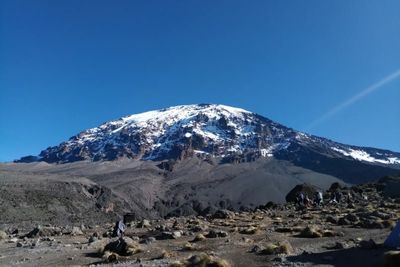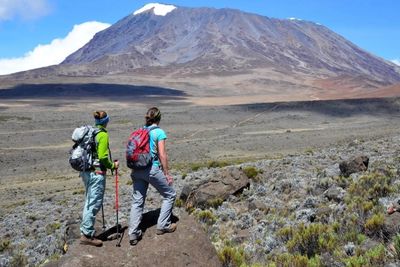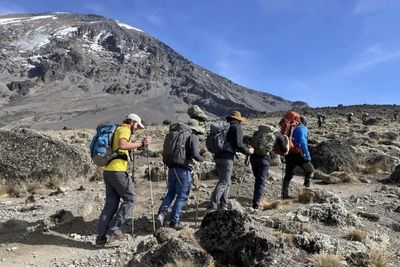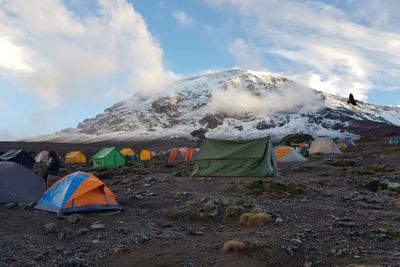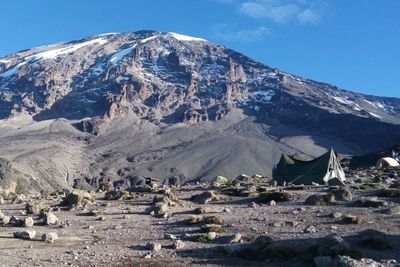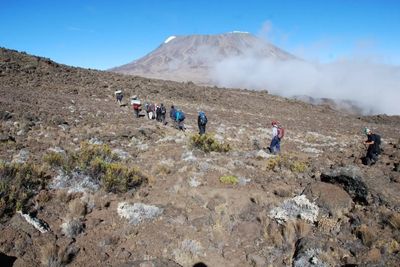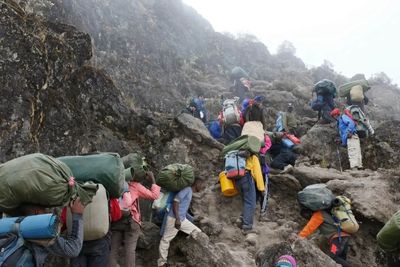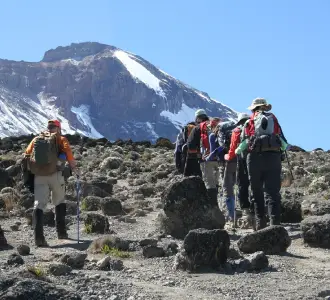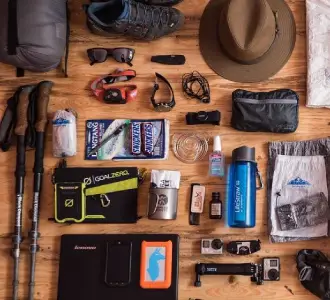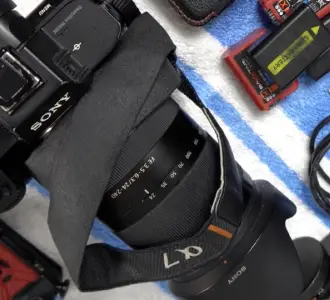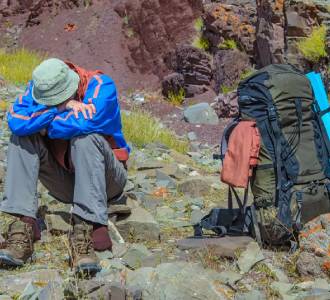Kilimanjaro Climbing Faqs
Top Kilimanjaro Climbing Questions and Simple Answers
Although climbing Kilimanjaro is an exhilarating adventure, there are a lot of factors to take into account. Our Climbing Kilimanjaro FAQs contain all you need to know, from airport arrivals and visa procedures to what to expect with your hiking group and mountain crew.
We maintain a relaxed and welcoming atmosphere so you may concentrate on the excitement of the next journey. We’ve also included helpful advice to make planning even easier. With the help of this book, you can make sure that your Mount Kilimanjaro Climbing Tours are organized, secure, and truly remarkable!
Why Visit Tanzania ?

Juma Rajabu Sumbi
255784751244
Top Questions About Kilimanjaro Trekking
What is climbing Mount Kilimanjaro really like?
Climbing Mount Kilimanjaro in Tanzania is an unforgettable adventure. It takes you through five unique ecosystems, leading up to the glacier-capped summit at 5,895 meters. You’ll trek alongside a dedicated mountain crew, experiencing diverse landscapes and facing a true physical challenge—making it a rewarding, once-in-a-lifetime journey.
How do I get to Mount Kilimanjaro?
The best way to Get to Mount Kilimanjaro is to fly into Kilimanjaro International Airport (JRO), which is 42 km from Moshi. You can also consider flights to Nairobi, Kenya, and then take a short flight or shuttle to Tanzania. This option may involve a visa for Kenya, so plan accordingly.
How many days early should I arrive for my Mount Kilimanjaro climb?
We recommend arriving at least one day before your climb. This extra day lets you settle in, adjust, and meet your fellow trekkers. If flights or luggage are delayed, having an extra day gives you time to resolve any issues without impacting your Mount Kilimanjaro Climbing schedule.
Do I need a visa for Mount Kilimanjaro in Tanzania?
Yes, most visitors need a Tanzania Visa. You can get a visa on arrival or apply online for an e-visa. The cost is $50 for most nationalities, but US citizens pay $100. Check that your passport is valid for six months beyond your departure date.
What’s the best route for Mount Kilimanjaro climbing?
Popular routes include the Machame, Lemosho, and Northern Circuit routes. The Lemosho and Machame routes are ideal for scenic beauty, while the Northern Circuit offers a longer path with better acclimatization. Every Kilimanjaro Climbing Route has its unique appeal, so choose based on your goals and fitness level.
Is Mount Kilimanjaro climbing difficult?
While climbing Mount Kilimanjaro doesn’t require technical skills, it’s still physically demanding due to altitude. You don’t need to be an expert climber, but good fitness, preparation, and mental resilience are important. Remember, many people of all ages and backgrounds reach the summit!
When is the best time to climb Kilimanjaro?
The Best Time to Climb Mount Kilimanjaro is during the dry seasons: January to March and June to October. These months offer stable weather and clearer skies. July to September is especially popular, so plan early if you want to climb during these months.
How much does the Kilimanjaro climb cost?
The Cost of a Mount Kilimanjaro Climb varies depending on the route and level of support. Basic climbs start around $1,500, while luxury climbs can exceed $3,000. The price usually includes guides, porters, park fees, and meals, but excludes flights and tips.
What should I pack for Mount Kilimanjaro hiking?
Essentials include layered clothing, sturdy hiking boots, a warm jacket, gloves, and a headlamp. A detailed Kilimanjaro Packing List will help ensure you have everything needed for a safe and comfortable trek. Good gear is key for braving the mountain’s changing climates.
Is altitude sickness a concern on Mount Kilimanjaro?
Yes, altitude sickness is the main challenge. Symptoms of Kilimanjaro Altitude Sickness include headaches, nausea, and fatigue. To reduce the risk, ascend slowly, stay hydrated, and consider routes that allow more days for acclimatization. Your guides will monitor you closely for any symptoms.
How do I stay clean while climbing Mount Kilimanjaro?
Showers are unavailable on Mount Kilimanjaro, but you’ll have access to warm water at campsites for washing. Bringing wet wipes is also a good idea. Private toilet tents are provided, though you may need to use public toilets at some campsites.
Can special diets be accommodated on Mount Kilimanjaro tours?
Yes, our team can accommodate most dietary needs, including vegetarian and gluten-free options. It’s best to let us know in advance to ensure we’re fully prepared for your Kilimanjaro Safari Experience with appropriate meal options.
Do I need vaccinations before visiting Mount Kilimanjaro in Tanzania?
If you’re travelling from a country with yellow fever, vaccination is required. Additional recommended vaccinations include Hepatitis A, typhoid, and tetanus. It’s best to check with your doctor to confirm the recommended vaccinations for Tanzania Travel Safety.
How do I physically prepare for Mount Kilimanjaro hiking?
Start Training for Kilimanjaro at least two months before your climb. Focus on cardio, leg strength, and endurance exercises. Activities like hiking, stair climbing, and jogging can help you build the stamina needed for a successful climb on Africa’s tallest mountain.
What food is served on Mount Kilimanjaro trekking tours?
Meals on the mountain include pasta, rice, vegetables, meat, and fresh fruits. Our cooks prepare nutritious, energy-packed Kilimanjaro Foods daily. Expect plenty of carbs and hot drinks to keep you fueled for the trek. You’re welcome to bring extra snacks like protein bars.
Is Mount Kilimanjaro climbing safe?
Yes, Kilimanjaro is safe when climbed with experienced guides. Our team is trained to handle altitude sickness and other emergencies. Following the guide’s pace and advice is important for a safe ascent. We prioritize your Kilimanjaro Travel Guide experience with safety as a top focus.
How can I avoid altitude sickness on Mount Kilimanjaro?
Take time to acclimatize by choosing a longer route, stay hydrated, and avoid rushing. Going “pole, pole” (slowly) is the best way to adjust to the altitude. You may also consider consulting a doctor about Kilimanjaro Altitude Sickness medication.
What should I know about luggage for Mount Kilimanjaro tours?
Your Kilimanjaro Porter will carry one duffel bag, while you carry a daypack. The daypack should have essentials like water, snacks, and rain gear. Keep the duffel bag under 15 kg to follow guidelines and make it easier for the porters.
Is there internet access on Mount Kilimanjaro?
Some network coverage is available up to 4,000 meters, and high-speed internet may soon reach the summit. However, many climbers enjoy disconnecting for a more immersive experience. We suggest embracing the Mount Kilimanjaro view without screens for a deeper connection to nature.
What should I bring for photographing Mount Kilimanjaro?
Bring a camera or phone with a protective case and extra batteries, as the cold can drain them quickly. Capture the beautiful sunrise and scenic views along the way for lasting memories of your Mount Kilimanjaro Hike.
Create Your Perfect Safari
Create Your Dream Journey
Talk to a Travel Expert
Why book with us?
Unbeatable Safari Deals
World Class Guides
24/7 Travel Support
Specialized Safari Vehicles
Find Your Ideal Kilimanjaro Trek
Duration: 9 Days
Experience: Mount Kilimanjaro
Price: On request
Duration: 8 Days
Experience: Mount Kilimanjaro
Price: On request
Duration: 8 Days
Experience: Mount Kilimanjaro
Price: On request
Duration: 8 Days
Experience: Mount Kilimanjaro
Price: On request
Duration: 7 Days
Experience: Mount Kilimanjaro
Price: On request
Duration: 6 Days
Experience: Mount Kilimanjaro
Price: On request
Duration: 7 Days
Experience: Mount Kilimanjaro
Price: On request








